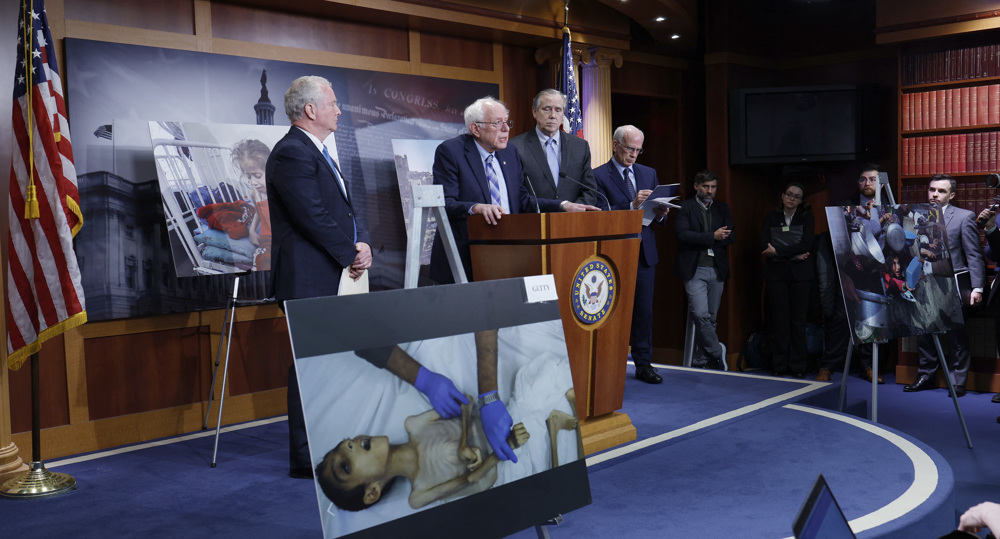New low-yield US nukes make nuclear conflict more likely: Lavrov
Russian Foreign Minister Sergey Lavrov has warned that the United States' decision to produce a low-yield nuclear warhead will only make a nuclear war more likely.
The US National Nuclear Security Agency (NNSA) confirmed Monday that it had started to produce a new low-yield nuclear warhead following President Donald Trump’s order last year to equip the Pentagon with tactical weapons that could be used in more realistic combat scenarios.
The new warhead was one of the three key changes introduced in the Trump administration's so-called Nuclear Posture Review (NPR). The other changes included development of a new sea-launched cruise missile and increased plutonium pit production over the next decade.
During a joint press conference with his Iraqi counterpart Mohamed Ali al-Hakim in Moscow, Lavrov said Wednesday that Russia had already warned about the potential risks of weapons upon the unveiling of the NPR.
"Even then we expressed serious concern that the development of such low-yield ammunition lowers the threshold for the use of nuclear weapons and, of course, increases the risk of a nuclear conflict," he said.

The NNSA said in its statement that the first production unit of the new warhead, dubbed W76-2, was in production at the Pantax Plant in Texas and would be delivered to the US military by the end of 2019 fiscal year.
The new nuclear device is based on the W76-1 warhead the US Navy has long been using to arm its Trident ballistic missiles.
Read More:
According to reports, the warhead is designed to be smaller than the nuclear bomb the US detonated at Hiroshima, Japan, during the Second World War.
Experts have warned that a low-yield nuclear weapon is still very powerful, considering that the atomic bomb used on Hiroshima killed between 60,000 and 80,000 people.
Lavrov said it remained to be seen whether the European Union would take action or would simply turn its back on Washington's move like it has done in similar cases in the past.
"It is significant to see what role was left for Europe by the US in these plans and what role Europe is ready to play, taking into consideration, that Europe supported the US’ previous unilateral actions," he said.
Russia and the US have been at odds over Trump's threats to leave the Intermediate-Range Nuclear Forces Treaty (INF), a landmark Cold War-era arms control treaty that requires them to eliminate all their nuclear and conventional missiles with ranges of 1,000–5,500 km (620–3,420 mi).
A White House official, who asked not to be identified, told Bloomberg on Monday that Washington would abandon INF unless Russia destroys all of its ground-launched cruise missiles known as 9M729, which the US insists is in violation of the treaty.
The senior Russian diplomat renewed his country's calls for resuming negotiations but doubted Washington's willingness to sit down for talks.
"We will see how Europe will react on a new step in unilateral US acts, which undermine the strategic stability. From our side, I will remind, that we have repeatedly offered Washington to restart dialogue on the strategic stability in its fullest account. This offer is still relevant, but unfortunately negotiations have not started yet," Lavrov said.
This is part of the US government's estimate that plans for modernizing and maintaining the country’s nuclear arsenal will cost nearly $500 billion over the next decade.
Upon revealing the NPR, the Trump administration emphasized that it was mainly designed to counter Russia and China as the two most imminent threats to US national security.
Earlier this month, Trump unveiled his revamped missile policy, which he said was aimed at countering the growing missile capabilities of Iran, Russia and China.
Israel kills 5 more paramedics in southern Lebanon: Health ministry
Iran to launch ‘new, advanced’ centrifuges in response to IAEA resolution: AEOI
Yemen fires hypersonic missile at Israeli airbase
VIDEO | New Delhi chokes under toxic smog as air quality remains at hazardous levels
VIDEO | Press TV's news headlines
VIDEO | ICC's arrest warrant for Netanyahu to worry Western politicians: Former British diplomat
Iranians protest against Israel after Netanyahu ICC warrant
Germany undecided on complying with ICC arrest warrants for Israeli war criminals











 This makes it easy to access the Press TV website
This makes it easy to access the Press TV website